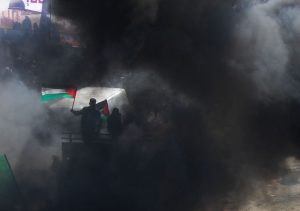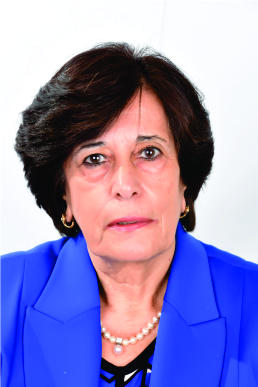Translated from Arabic by Areej Daibes
A discussion of the political developments over the last twenty years entails a review of the era that followed the signing of the Oslo Agreement in 1993, the subsequent Gaza-Jericho First agreement in May 1994, and the Interim Agreement in September 1995. These agreements divided Palestinian cities and villages into areas classified as “A” (including main urban centers), “B” (including Palestinian towns and villages), and “C” (including small villages, water resources, agricultural lands, and natural resources) – with a negative impact on Palestine’s geographic contiguity. Furthermore, these agreements have restricted Palestinian action at political, economic, and social levels, particularly because Israel has extended efforts, with Zionist and racist policies, to abort the Palestinian liberation project that aims to end the Israeli occupation, establish a contiguous and sovereign Palestinian state in all the territories that were occupied in June 1967, ensure the Palestinian people’s right to self-determination, and guarantee the right of return of Palestinian refugees according to UN Resolution 194. The assassination of Israeli Prime Minister Rabin in November 1995 constituted a death sentence for the peace process. Yet, its demise has remained unacknowledged, perpetuating the illusion of peace while Israel continues to impose new facts on the ground which make the establishment of a Palestinian state increasingly impossible.
Against this background, I will briefly focus on a number of aspects that I consider the basis for a political review of this phase. First, there is Israel’s non-compliance with the peace process or the implementation of the Oslo Agreement according to the agreed-upon stages. The transitional phase ended in 1999, and final status negotiations regarding Jerusalem, settlements, refugees, borders, and water should have started. Twenty years have passed and Israel not only has not withdrawn but has actually carried out a major incursion into all West Bank cities, designated as areas A, during 2002–2003, killing more than 1,500 Palestinians, injuring thousands, demolishing many houses and displacing their residents, and destroying the infrastructure and government institutions in many West Bank cities; it continues to uproot trees, bulldoze cultivated lands, and causes major losses at both the individual and governmental levels. Israel then besieged the late President Yasser Arafat, whose poisoning remains a mystery even today!

Settlement expansion policies have continued and accelerated despite the Oslo Agreements. In 1996, close to 309,000*1 settlers lived in the occupied Palestinian territories; by 2017, the number of settlers in the West Bank and East Jerusalem had reached some 607,000. Israel has built bypass roads that connect settlements but isolate Palestinian cities and villages from each other, fragmenting the Palestinian social fabric and forcing thousands of Palestinians to live with limited access to their communities. Israeli checkpoints impede economic development and force Palestinians to waste their time waiting to pass through them. According to the Office for the Coordination of Humanitarian Affairs, “By the end of 2016, there were 572 fixed movement obstacles, including 44 permanently staffed checkpoints, 52 partially staffed checkpoints, and 376 roadblocks, earth mounds, and road gates. More than 100 additional obstacles, including 18 permanent checkpoints, segregate part of the Israeli-controlled area of Hebron city (H2) from the rest of the city.”*2 Whereas Palestinians aspire to freedom and independence, Israel built the Separation Wall that has de facto annexed more lands, isolated Jerusalem from its Palestinian environment, and prevented West Bank farmers from accessing their lands. The West Bank has been entirely separated from the Gaza Strip, which has been placed under a tight siege ever since Israel’s unilateral withdrawal in 2005. It has launched three wars against the Gaza Strip, destroying four-fifths of its infrastructure and causing full or partial destruction of some 17,800 homes.*3
Israeli policies have set consistent and long-term objectives accompanied by a solid official and popular position towards any future solution, particularly in terms of East Jerusalem. In line with its objectives, Israel has established facts on the ground and convinced its allies to tacitly accept its position. In fact, President Trump’s so-called deal of the century − which is largely consistent with the Israeli position towards Jerusalem, settlements, and refugees − can be seen in this context. President Trump’s declaration that the United States recognize Jerusalem as the unified capital of Israel; his moving of the US embassy to Jerusalem; his vetoing*4 of the UN Draft Resolution that objected to continued settlement building, called on all states to refrain from moving their embassies to Jerusalem, and was endorsed by the remaining 14 member countries of the UN Security Council*5; as well as his cutting US aid to UNRWA, constitute practical steps to remove three key issues (namely Jerusalem, refugees, and settlements) from the agenda of any future negotiations. He is thereby undermining the two-state solution in order to satisfy Israel’s ambitions in the region.
These events and the ensuing Israeli policies with increased house demolitions, settler attacks on Palestinians,*6 and expansion of settlements have shocked Palestinians both on official and popular levels. The dream of establishing a Palestinian state seems out of reach now, particularly in view of the events in the Arab world where a number of countries are preoccupied with their internal conditions, sectarian conflicts, and socio-economic problems created by ISIS, while others are rushing to normalize relations with Israel in the absence of a solution to the Palestinian-Israeli conflict. Arab countries are turning their backs on the 2002 Arab Peace Initiative and are united in portraying Iran as the enemy. These developments have pushed the Palestinian leadership to intensify the international diplomatic efforts where significant successes were achieved: The number of countries that recognize Palestine has risen to 138, important resolutions in support of the Palestinian question have been issued at the UN General Assembly, and numerous condemnations of Israeli measures against the Palestinian people have been voiced. The Palestinian leadership has resorted to the International Criminal Court (ICC) against President Trump over his decision to recognize united Jerusalem as the capital of Israel and move the US embassy to Jerusalem. In addition, the state of Palestine has joined a number of international organizations. Furthermore, solidarity movements and the Boycott, Divestment and Sanctions (BDS) movement are expanding continuously. Yet, whereas these successes are important and their continuation can contribute towards strengthening the status of the state of Palestine, they are insufficient in terms of confronting the Zionist project.
The demise of the so-called peace process is obvious, yet…
There is a need for increased popular, governmental, and international efforts towards two goals: First, we must end the ongoing internal division in Palestine that has been in place for the last 11 years, unify the Palestinian people, strengthen popular resistance, consolidate unity of action and political partnership, and devise generally agreed-upon plans of action that contribute towards progress in the realization of the national rights of our people. This includes the need to conduct presidential and legislative elections as well as elections for the Palestinian National Council where we must aim for a minimum of 30 percent representation, each, for women and youth, since they are viewed as the main drivers of change. The absence of the Palestinian Legislative Council has largely contributed towards strengthening individualism and marginalizing the role of civil society organizations. Furthermore, there is an absence in terms of the popular role in proposing laws and endorsing the decrees that are issued by the president for legislation that was proposed by civil society organizations through PLC members. These should be discussed and approved by the Legislative Council as appropriate and stipulated by the Basic Law. In addition, the government must be held accountable for the budget, its approval, and the extent to which it is implemented, and controls must be devised to minimize corruption within state agencies and NGOs.
Second, we must reiterate that the basic principles of human rights and the Geneva Conventions should be upheld, as they assert a people’s right to self-determination and its right to struggle for freedom and independence, as highlighted as well by the Palestinian Declaration of Independence. Through their struggle against the Zionist policies, our people have proven that they are determined to end the occupation and achieve their legitimate rights, be it through the hunger strikes of Palestinian prisoners who wish to highlight their humanitarian needs and protest against administrative detention, or through the recent Al-Quds/Jerusalem protests against the Israeli authorities’ use of metal gates at the entrances of Al-Aqsa Mosque, or in the struggle of Al-Khan Al-Ahmar’s community that continues to remain steadfast against its possible demolition and the displacement of its residents.
In line with international law, the Palestinian Declaration of Independence stipulates the right to freedom, equality, and non-discrimination based on gender as well as social justice for all, regardless of religion or race. Allowing for civil liberty and for the freedom of expression in PA-controlled areas encourages initiatives and strengthens the role of citizens to be able to confront the occupation. A free society in which citizens enjoy a minimum level of dignity can remain capable of realizing its desired victory through steadfastness and perseverance.
*1 Foundation for Middle East Peace, Israeli Settler Population 1972−2006, available at goo.gl/N98f9F.
*2 Office for the Coordination of Humanitarian Affairs OCHA, West Bank: Movement and Access, December 2017,
available at goo.gl/kXqd1M; OCHA lists the presence of 705 Israeli checkpoints in Humanitarian Bulletin:
Occupied Palestinian Territories, September 2018; and B’Tselem – The Israeli Information Center on Human Rights in the Occupied Territories, List of military checkpoints in the West Bank and Gaza Strip, updated June 2018, available at goo.gl/jGP85j.
*3 UN Office of the High Commissioner of Humanitarian Affairs OCHA, 22,000 people in the Gaza Strip still internally displaced from the 2014 hostilities, April 5, 2018, \ available at goo.gl/4zUsLa.
*4 Laurel Wamsley, “U.S. Vetoes U.N. Security Council Resolution Voiding Trump’s Jerusalem Move,” National Public Radio, December 18, 2017, available at goo.gl/TFd1fa.
*5 UN General Assembly Meetings Coverage, “General Assembly Overwhelmingly Adopts Resolution Asking Nations Not to Locate Diplomatic Missions in Jerusalem,” December 21, 2017, available at goo.gl/Cn97xc.
*6 OCHA, High level of violence by Israeli settlers; rise in Israeli fatalities, November 2018, available at goo.gl/XNP1mJ.


